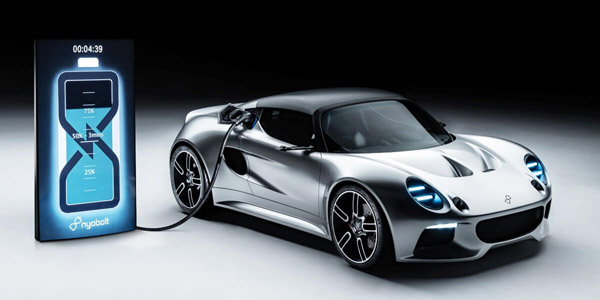
Remember early mobile phones, the ones they used to call a brick?
They were quickly made obsolete by much smaller, more efficient and better smartphones.
A 2024 sports car called the Nyobolt seems to be the world’s first EV brick slayer, able to
be fully recharged in a scant six minutes.
The Nyobolt EV is the result of a collaboration between British design and engineering firm
Callum and battery producer Nyobolt.
The very Lotus Elise-looking sports coupe has a 35kWh battery that can propel it for up to
250km between charges. And since it takes just a blink to recharge, owners will be able to
sleep at night, knowing that there’s nothing on charge that can blow up their EV and set
their home ablaze as well.
Based in Cambridge, Nyobolt says its new lithium-ion battery technology is ready to
deploy, with production starting in early 2024.
The company has tested its batteries for more than 2000 fast charge cycles, without
finding any significant performance loss and says its technology can also be applied to
larger batteries, which could also be made to charge within a few minutes — as soon as
1mW chargers become available.
“Unlocking the challenges faced by electric vehicle designers has been key to the
development of our breakthrough fast-charging batteries,” Nyobolt CEO Sai Shivareddy
said.
“Previously, enabling a light weight fast-charging vehicle was not possible without
compromising its lifetime and so people have been relying on costly and large battery
packs in the vehicle.
“With our unique technology, we have achieved a six-minute charge car, and developed
smaller battery packs that can deliver more power and charge in less time.”
The Nyobolt sports car was designed by Julian Thomson, the same chap who designed
the Lotus Elise, but his car has more contemporary lines and is longer, lower and wider
than an Elise.
Nyobolt’s vision is to resolve the core problems at the heart of the EV industry that are
hindering the widespread adoption of electric cars globally.
Most electric vehicle batteries are big, heavy and costly, with vehicles often weighing over
two tonnes.
The requirement for heavy EV battery packs places a huge strain on the supply of battery
raw materials, but Nyobolt says its technology translates to a nimbler, more efficient EV
with a lower up-front cost, lower running costs and lower use of scarce raw material.
Its EV weighs closer to one tonne than two.
With Callum and Nyobolt working hand-in-hand, a system-level approach has addressed
each element from materials, to cell, to pack, to drivetrain, to whole vehicle.
“The final collaborative design therefore reflects the original vehicle’s premise of a high
power-to-weight ratio within an exquisite package,” the company says.
David Fairbairn, managing director at Callum, said: “Nyobolt’s pioneering battery
technology has provided us with a unique and inspiring opportunity to support in the
design and execution of a vehicle set to mark the way forward for EV technology.
“The collaborative creativity, engineering capabilities and steadfast efforts of Nyobolt,
Julian Thomson and Callum have resulted in an EV that is not only exciting technically for
the industry, but something that is beautiful to behold, too.”
Nyobolt also said on Friday it has raised 50 million pounds (A$93m) in Series B funding to
build a UK manufacturing plant to produce millions of battery cells.